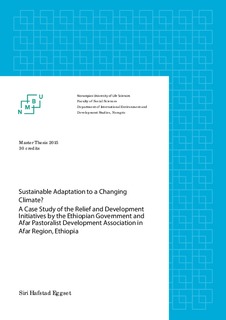| dc.description.abstract | This thesis examines how the Ethiopian government and the Afar Pastoralist Development Association (APDA) work in practice to reduce people’s vulnerability and whether they contribute to ‘sustainable climate change adaptation’ in Serdo sub-district of Ethiopia’s Afar Region. The data collection methods that were used to answer this objective were semi-structured interviewing, observation of development initiatives and document analysis. Findings on relief initiatives such as the government’s Productive Safety Net Program (PSNP), APDA’s animal supplementary feeding and water trucking, and education, health, water and DRR initiatives are analyzed using theories on climate change adaptation, transformation and dependency, with specific focus on the five principles of sustainable adaptation.
The thesis discovers that the government exacerbates vulnerability through its sedentary development initiatives and that it does not integrate long-term adaptation thinking in its drought relief. With a ‘business as usual’ approach to development, the government aims to build adaptive capacity through sedentarisation. Pastoralists do not participate in the decision making processes of the initiatives, and the government does not account for local power structures, traditional adaptation strategies or knowledge. Pastoralists thus have to settle down to get access to the government’s development and relief initiatives. But since settlement decreases livestock holdings, pastoralists become increasingly dependent on unpredictable and insufficient drought relief such as PSNP food aid and water trucking. Hence, the government has several challenges to address and changes to make to contribute to sustainable adaptation at local level.
Through its community-development approach that focuses on mobility, APDA reduces vulnerability and integrates long-term adaptation in its relief initiatives. Sedentarisation is not a prerequisite to access the organization’s initiatives. The organization rather focuses on strengthening pastoralists’ traditional adaptation strategies through its development and relief initiatives and gives pastoralists power over their own development process. In this way, APDA contributes to sustainable adaptation at local level.
Whereas settling down can be a viable solution to strengthen adaptive capacity for some pastoralists, it has adverse consequences for those who depend on their livestock. This thesis therefore concludes that development and relief actors should aim to strengthen rather than transform pastoralists’ traditional adaptation strategies. The most sustainable way to strengthen traditional adaptation strategies is to empower pastoral communities to take charge over their own development. Both APDA and the government claim that they include pastoralists in the development process, but only APDA takes on a bottom-up approach in practice. The challenge for the government is therefore to practice participation as much in practice as it embraces it in its policy documents. | nb_NO |
